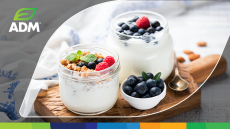Fortified milk may cut illnesses in preschoolers
occurrence of respiratory infections and days with severe illness,
and could be a well accepted means of improving health, especially
amongst pre-schoolers in the developing world, says new research.
According to the United Nations World Food Programme, iron deficiency is the most common form of malnutrition, affecting 4.5 billion people worldwide. It is estimated to impair the mental development of 40-60 percent children in developing countries.
More than the health impact, the WFP also says that widespread iron deficiency damages productivity and can cut GDP by as much as two percent in some countries.
Moreover, a study released by the UN-backed Food and Agriculture Organization (FAO) in February 2004 concluded that preventing malnutrition and hunger in pregnant women and children could stop the onset of obesity in later life.
"Our results suggest that micronutrients can be delivered successfully through fortified milk, which is also a well-accepted delivery method," said lead researcher Sunil Sazawal from Johns Hopkins Bloomberg School of Public Health.
The randomised, double masked placebo controlled trial recruited 633 children (age range one to four) in New Delhi, and assigned 316 kids to receive the fortified milk, containing iron (9.6 mg per day), selenium (4.2 micrograms), copper (0.27 mg), zinc (7.8 mg), and vitamins A (156 micrograms), C (40.2 mg) and E (7.5 mg). The remaining 317 children received the same milk without fortification.
"Some micronutrients have a crucial role in generation, maintenance and amplification of immune responses in the body. Deficiencies in multiple micronutrients among preschool children are an important determinant of child health in developing countries," said Sazawal.
Sazawal and colleagues report that the children who received fortified milk had fewer episodes of diarrhea (18 per cent less) and pneumonia (26 per cent less) than the children receiving the unfortified milk, and also reported fewer days with severe illness (15 per cent less).
"The fact that all the children in the study received about 1.89 mega joules of energy, 20 grams of protein, 49 grams of carbohydrate, and 19 grams of fat, in addition to their complimentary foods or breast milk, suggests that these effects could be expected even in moderately well fed children," said the researchers.
Study co-author Robert Black said: "Together, these results suggest an improved immunity against common infections in children."
While the combination of the nutrients prevented the researchers to determine individual contributions of the individual micronutrients, Sazawal and co-workers note that such nutrients act as antioxidants and also as co-factors in cytokine regulation that plays a role in the immune response.
"Given that the latest estimates of the percentage of gross domestic product lost to all forms of vitamin and mineral deficiency is one to two per cent in the developing world, there is an urgent need to develop and implement strategies to reduce the burden of these deficiencies," said the researchers.
The research was funded by Fonterra Brands, an arm of New Zealand's leading dairy co-operative Fonterra. The company has a history of funding research into the potential benefits of its fortified milks.
Indeed, the firm has previously backed studies using fortified milk in order to support the marketing of its ANMUM pregnancy milk brand - fortified with folate and specifically targetted at pregnant women.
Source: British Medical Journal Online first, doi: 10.1136/bmj.39035.482396.55 "Effects of fortified milk on morbidity in young children in north India: community based, randomized, double masked placebo controlled trial" Authors: S. Sazawal et al.











